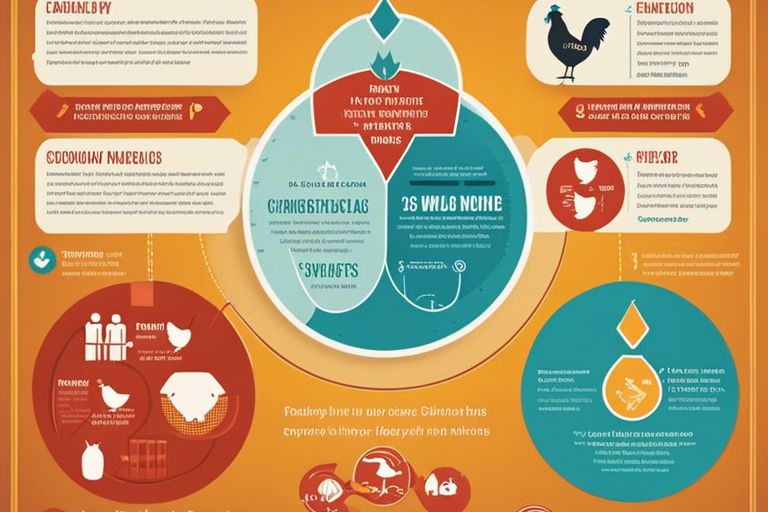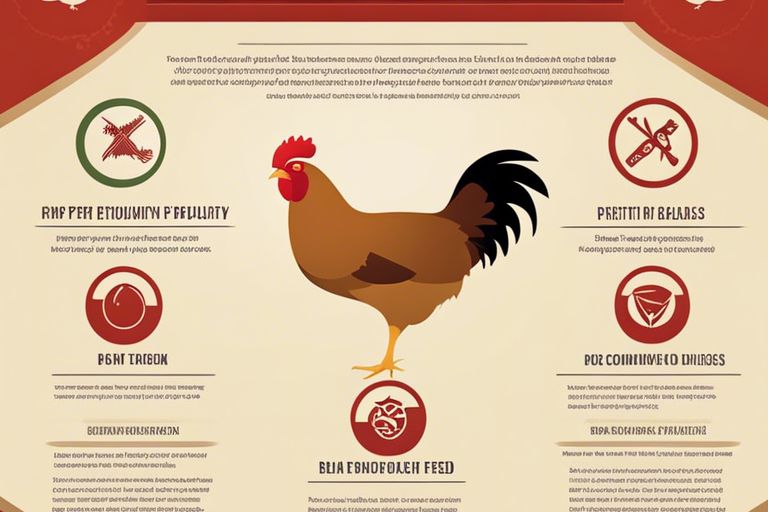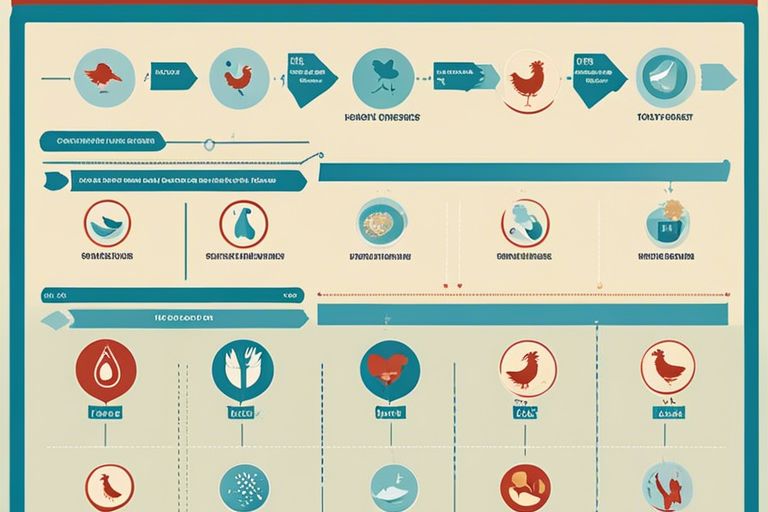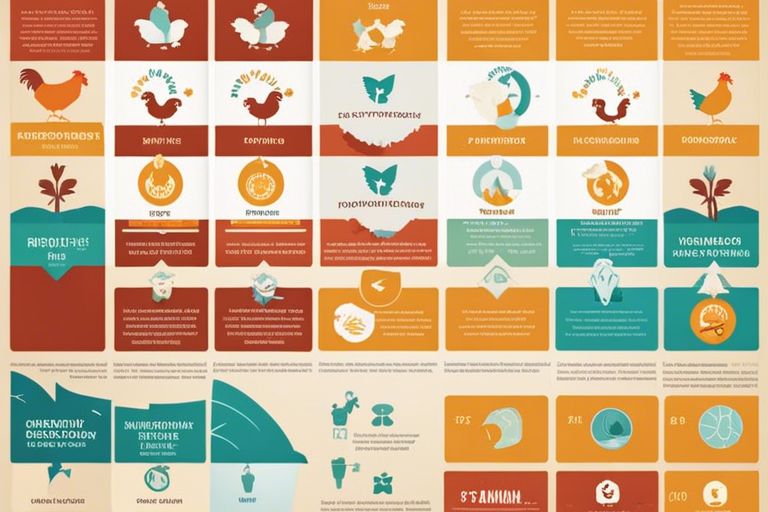There’s nothing more devastating to a flock of poultry than the outbreak of a preventable disease. In this comprehensive guide, we will cover everything you need to know to keep your feathered friends healthy and thriving. From proper nutrition and hygiene practices to vaccination schedules and biosecurity measures, we have you covered. By following these imperative tips and strategies, you can protect your poultry from common diseases and ensure a happy and disease-free environment for your birds.

Types of Poultry Diseases
While keeping poultry can be a rewarding experience, it is important to be aware of the various diseases that can affect your flock. By understanding the types of poultry diseases that are common, you can take proactive steps to prevent them and ensure the health and well-being of your birds. Knowing the signs and symptoms of these diseases can help you to identify and treat them early, minimizing the impact on your flock.
| Bacterial Diseases | Viral Diseases |
| Parasitic Diseases | Fungal Diseases |
| Nutritional Deficiencies |
Bacterial Diseases
On poultry farms, bacterial diseases such as Salmonella and E. coli can pose a significant threat to the health of your birds. These diseases are often spread through contaminated water, feed, or surfaces. Implementing good hygiene practices and regularly sanitizing your poultry coop can help prevent the spread of bacterial infections.
Viral Diseases
Viral diseases like Newcastle disease and Avian influenza can spread quickly among poultry flocks, causing high mortality rates. Vaccination plays a crucial role in preventing viral diseases, along with strict biosecurity measures to control the spread of the virus. Regular monitoring for any signs of illness and immediate isolation of sick birds can help protect the rest of your flock.
Viruses are microscopic pathogens that can cause a range of symptoms in poultry, including respiratory distress, decreased egg production, and neurological signs. The viral diseases can be highly contagious and have the potential to devastate an entire flock if not properly managed.
Parasitic Diseases
Parasitic diseases in poultry, such as coccidiosis and mites, can impact the health and productivity of your birds. Parasites can weaken the immune system of poultry, making them more susceptible to other diseases. Regularly deworming your flock and keeping their living environment clean can help prevent parasitic infestations.
To effectively manage parasitic diseases, it is important to identify the specific parasite affecting your birds and use the appropriate treatment. Consult with a veterinarian for guidance on parasite control measures and monitoring techniques to keep your flock healthy and thriving.
Fungal Diseases
Some common fungal diseases in poultry include Aspergillosis and Candidiasis, which can affect the respiratory and digestive systems of birds. Fungi thrive in warm and damp environments, so proper ventilation and moisture control in the poultry coop are crucial in preventing fungal infections. Maintaining good hygiene practices and regularly cleaning feeders and waterers can also help reduce the risk of fungal diseases.
Understanding the symptoms of fungal diseases, such as difficulty breathing, reduced appetite, and discolored droppings, can aid in early detection and treatment. Fungal infections can be challenging to eradicate once established, so prevention is key in protecting your flock from these diseases.

Factors Contributing to Disease Outbreaks
Biological Factors
Contributing to disease outbreaks in poultry are various biological factors that can easily spread among flocks. Common biological factors include viruses, bacteria, parasites, and fungi. These pathogens can flourish in crowded living conditions, leading to the rapid transmission of diseases among birds. Proper biosecurity measures and regular health checks are imperative in preventing the spread of these biological agents.
- Regular health checks are crucial in preventing disease outbreaks.
- Proper biosecurity measures can help contain the spread of pathogens.
- Healthy living conditions can reduce the risk of disease transmission.
This emphasizes the importance of proactive measures in maintaining the health and well-being of poultry populations.
Environmental Factors
While biological factors play a crucial role, environmental factors also significantly contribute to disease outbreaks in poultry. Factors such as poor ventilation, high humidity, inadequate waste management, and contaminated water sources can create ideal conditions for pathogens to thrive. Maintaining clean and well-ventilated poultry housing, proper waste disposal practices, and ensuring a clean water supply are imperative in reducing the risk of disease spread.
- Proper ventilation is vital for reducing the spread of diseases.
- Regular waste management practices can help eliminate breeding grounds for pathogens.
- Clean water sources are imperative for maintaining flock health.
This highlights the importance of a hygienic environment in preventing disease outbreaks.
Farm Management Practices
Another critical factor contributing to disease outbreaks in poultry is poor farm management practices. Inadequate sanitation, overcrowding, improper nutrition, and lack of vaccination protocols can weaken the immune systems of birds, making them more susceptible to diseases. Implementing strict biosecurity measures, maintaining optimal stocking densities, providing balanced nutrition, and following vaccination schedules are crucial in preventing disease outbreaks on poultry farms.
- Strict biosecurity measures are imperative for preventing disease spread.
- Maintaining optimal stocking densities can reduce stress and prevent disease transmission.
- Following vaccination schedules is vital in boosting the immunity of birds.
To effectively prevent disease outbreaks, it is imperative to adopt sound farm management practices and prioritize the health and welfare of poultry.

Step-by-Step Guide to Disease Prevention
| Biosecurity Measures | Vaccination Strategies |
| Assuming strict biosecurity measures are in place is the foundation of disease prevention in poultry farming. This includes controlling access to your flock, proper hygiene practices, and monitoring visitors and equipment for potential disease carriers. | You should work closely with a veterinarian to develop a customized vaccination program for your poultry. Vaccination can significantly reduce the risk of infectious diseases and should be administered according to a schedule to ensure optimal protection. |
Biosecurity Measures
Assuming strict biosecurity measures are in place is the foundation of disease prevention in poultry farming. This includes controlling access to your flock, proper hygiene practices, and monitoring visitors and equipment for potential disease carriers.
Vaccination Strategies
You should work closely with a veterinarian to develop a customized vaccination program for your poultry. Vaccination can significantly reduce the risk of infectious diseases and should be administered according to a schedule to ensure optimal protection.
- Ensure all birds are properly vaccinated according to recommended schedules.
- Provide clean drinking water and balanced feed to support a strong immune system.
- Monitor birds for any signs of illness and isolate any sick individuals immediately.
Understanding the nutritional requirements of different poultry species is crucial for maintaining their health and preventing diseases. Proper nutrition and feeding practices play a vital role in supporting the immune system and overall well-being of the birds.
- Offer a balanced diet that meets the specific nutritional needs of your poultry.
- Provide access to fresh, clean water at all times.
- Monitor the birds’ body condition and adjust feed rations accordingly.
Recognizing the importance of proactive disease prevention strategies such as vaccination and proper nutrition is key to ensuring a healthy flock and maximizing productivity in your poultry farming operations.
Advanced Prevention Tips and Best Practices
Many advanced prevention strategies can help poultry farmers protect their flocks from common diseases. By implementing these best practices, farmers can reduce the risk of outbreaks and maintain the health of their birds.
-
- Breeding for Disease Resistance
| Resistance | One effective way to prevent diseases in poultry is by breeding for disease resistance. Selecting birds with strong immune systems and genetic traits that make them less susceptible to common illnesses can help improve the overall health of the flock. |
-
-
- Latest Research and Innovations in Poultry Health
-
| Prevention | Ongoing research and innovations in poultry health offer new opportunities for disease prevention. From advances in vaccination techniques to the development of probiotics for poultry, staying informed about the latest trends in poultry health can help farmers proactively protect their flocks. |
Practices Many poultry diseases can be prevented through proper biosecurity measures, such as limiting the introduction of new birds, keeping facilities clean, and monitoring the health of the flock regularly. Additionally, maintaining a balanced diet, providing clean water, and ensuring proper ventilation in poultry houses are imperative practices for preventing common diseases.
Summing up
With these considerations in mind, you are now well-equipped to prevent common poultry diseases and ensure the health and well-being of your flock. By implementing proper biosecurity measures, maintaining a clean environment, practicing good hygiene, providing a balanced diet, and monitoring the health of your birds regularly, you can greatly reduce the risk of diseases spreading among your poultry. Remember that early detection and prompt action are crucial in preventing outbreaks, so stay vigilant and proactive in managing the health of your flock. By following the guidelines outlined in this ultimate guide, you can help your poultry live healthier and happier lives.
FAQ
Q: What are some common poultry diseases to watch out for?
A: Common poultry diseases to watch out for include coccidiosis, Marek’s disease, infectious bronchitis, and avian influenza.
Q: How can I prevent poultry diseases on my farm?
A: To prevent poultry diseases on your farm, maintain good hygiene practices, provide a clean living environment, practice biosecurity measures, and vaccinate your birds as recommended.
Q: What are the symptoms of poultry diseases?
A: Symptoms of poultry diseases can vary but may include lethargy, decreased egg production, respiratory issues, diarrhea, and abnormal behavior.
Q: How important is vaccination in preventing poultry diseases?
A: Vaccination is crucial in preventing poultry diseases as it helps to build immunity in birds and reduce the risk of infections spreading within the flock.
Q: Are there natural remedies to prevent poultry diseases?
A: While proper hygiene and vaccination are key, some natural remedies such as adding probiotics to the feed or using herbal supplements may help boost the immune system of poultry.
Q: What role does nutrition play in preventing poultry diseases?
A: Nutrition plays a vital role in preventing poultry diseases as a well-balanced diet rich in important nutrients helps to strengthen the immune system of birds and keep them healthy.
Q: How can I implement biosecurity measures on my poultry farm?
A: Implementing biosecurity measures on your poultry farm involves restricting access to outsiders, disinfecting equipment and clothing, and monitoring the health of your flock regularly to prevent the spread of diseases.











